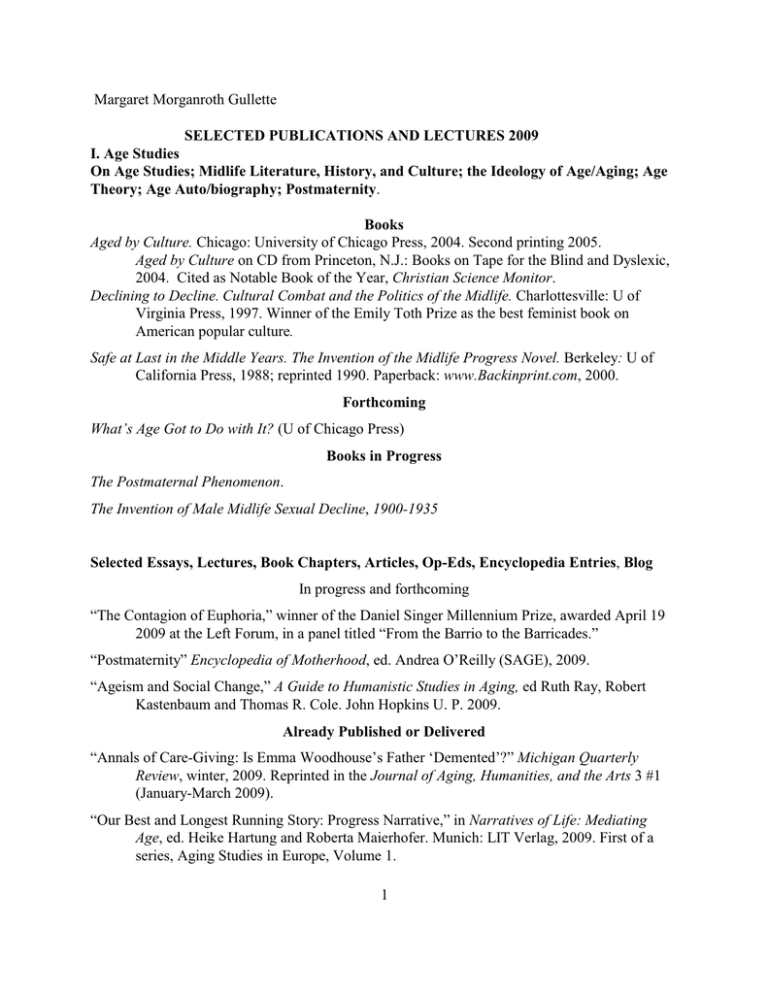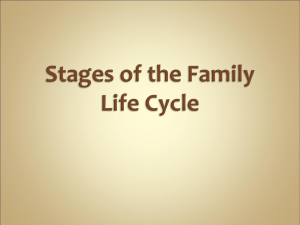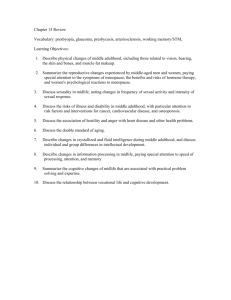
Margaret Morganroth Gullette
SELECTED PUBLICATIONS AND LECTURES 2009
I. Age Studies
On Age Studies; Midlife Literature, History, and Culture; the Ideology of Age/Aging; Age
Theory; Age Auto/biography; Postmaternity.
Books
Aged by Culture. Chicago: University of Chicago Press, 2004. Second printing 2005.
Aged by Culture on CD from Princeton, N.J.: Books on Tape for the Blind and Dyslexic,
2004. Cited as Notable Book of the Year, Christian Science Monitor.
Declining to Decline. Cultural Combat and the Politics of the Midlife. Charlottesville: U of
Virginia Press, 1997. Winner of the Emily Toth Prize as the best feminist book on
American popular culture.
Safe at Last in the Middle Years. The Invention of the Midlife Progress Novel. Berkeley: U of
California Press, 1988; reprinted 1990. Paperback: www.Backinprint.com, 2000.
Forthcoming
What’s Age Got to Do with It? (U of Chicago Press)
Books in Progress
The Postmaternal Phenomenon.
The Invention of Male Midlife Sexual Decline, 1900-1935
Selected Essays, Lectures, Book Chapters, Articles, Op-Eds, Encyclopedia Entries, Blog
In progress and forthcoming
“The Contagion of Euphoria,” winner of the Daniel Singer Millennium Prize, awarded April 19
2009 at the Left Forum, in a panel titled “From the Barrio to the Barricades.”
“Postmaternity” Encyclopedia of Motherhood, ed. Andrea O’Reilly (SAGE), 2009.
“Ageism and Social Change,” A Guide to Humanistic Studies in Aging, ed Ruth Ray, Robert
Kastenbaum and Thomas R. Cole. John Hopkins U. P. 2009.
Already Published or Delivered
“Annals of Care-Giving: Is Emma Woodhouse’s Father ‘Demented’?” Michigan Quarterly
Review, winter, 2009. Reprinted in the Journal of Aging, Humanities, and the Arts 3 #1
(January-March 2009).
“Our Best and Longest Running Story: Progress Narrative,” in Narratives of Life: Mediating
Age, ed. Heike Hartung and Roberta Maierhofer. Munich: LIT Verlag, 2009. First of a
series, Aging Studies in Europe, Volume 1.
1
“Exits from Decline,” keynote lecture, Center for Gender and Diversity 10th Anniversary
Conference, Maastricht University, Netherlands, March 2009.
“‘The Xers’ vs. ‘The Boomers’: A Contrived War,” chapter of Aged by Culture reprinted in
Sociology: Exploring the Architecture of Everyday Life. Readings, 6th edition, ed. David
M. Newman and Jodi A. O’Brien. Sage Publications: 2006; 7th edition, 2008.
“Plastic Surgery (Thankfully) Goes Under the Knife,” www. WomensENews, November 26,
2008
“Is that Hate Speech Meant for ME?” Panelist, New England Popular Culture Association, UMass, Dartmouth, October 31, 2008.
“Aging is NOT a collection of diseases,” WIMNonline.org/WIMNSVoicesBlog, August 6, 2008.
“What’s Age Got to Do With It? My Life in Age Studies,” Coming of Age: First-Generation
Critics Reflect on Age, Aging and the Making of Critical Gerontology, edited by Ruth
Ray and Thomas R. Cole (Journal of Aging Studies 22 # 2 , Spring 2008).
“Then and Now: What Have the Sexual “Revolutions” Wrought?” (essay), Women’s Review of
Books, January/ February 2008: Originally called “Youthsex Then and Now”
“Losing Lear, Finding Ageism: the Role of the Gerontological Imagination in the Arts and
Humanities,” Journal of Aging, the Humanities and the Arts, June 2007. Originally
delivered to the Presidential Symposium, American Gerontological Society, Dallas,
November 18, 2006.
“‘Anti-Aging’ Boom Exploits Midlife Unemployment Fears,” www. WomensENews.org, May
2, 2007.
“Trapped in American Decline Culture” (reprint from In These Times), in Reading Culture:
Contexts from Critical Reading and Writing,” 6th edition, edited Diana George and John
Trimbur. Pearson, Longman, 2007.
“Our Best and Longest-Running Story: Sartre and Heilbrun,” talk at international conference on
Gender-Age-Storytelling, University of Greiswald, Germany, September 4-6, 2006.
“Preparing for the Next Catastrophe: What Americans Need to Know about Geriatric Psychiatry
in the Wake of Katrina,” American Association of Geriatric Psychiatrists, New Orleans
March 3, 2007
“Opciones duras para San Juan del Sur” or “Stark Choices for San Juan del Sur” El Nuevo Diario
(major national newspaper, Nicaragua), February 2007
“Hormone Nostalgia: Estrogen, not menopause, is the public health issue.” American Prospect
online, under the title, “Pause for Concern,” www. Prospect.org, January 23, 2007.
Women, the Media, Age and Aging Blog (4): “Eye Candy for the Female Gaze,” www.
WIMNonline.org/WIMNsVoicesBlog
Women, the Media, Age and Aging Blog (3): “Did You Know? The Older We Get, the Better
2
We Sleep,” www. WIMNonline.org/WIMNsVoicesBlog
“Women, the Media, Age and Aging” Blog:(2): “Is it Aging or Ageism that Causes the Pain?”
Www. WIMNonline.org/WIMNsVoicesBlog
“Hormone Nostalgia: Menopause Discourse After the Debacle,” Women, Wellness, and the
Media, ed. Margaret Wiley, Cambridge Scholars Press, 2008.
“What, Menopause Again! After the Hormone Debacle,” WSRC, Brandeis, Dec. 12, 2006;
longer version of “Menopause 2006: After the Hormone Debacle.” WAM! Conference,
April 1, 2006.
“Our Best and Longest-Running Story. “ Invited lecture, Age, Gender, and Narrative conference,
Greifswald, Germany, September 2006. “Top Ten Reasons for Changing American Age
Culture,” American Embassy, British Council, Konrad Adenauer Foundation, Berlin,
September 2006
“Women, the Media, Age and Aging,” Blog (1)“Will It Be Katrina All Over Again?”
(WIMNonline.org/WIMNsVoicesBlog September 2006
“Tragic Toll of Age Bias,” Boston Sunday Globe, August 27, 2006:
“Katrina and the Politics of Aging,” in There is No Such Thing as a Natural Disaster: ed. Greg
Squires and Chester Hartman. New York: Routledge, 2006. As of April 2007, it went into
a second printing, and a third is being planned.
Chapter Eight of Aged by Culture reprinted on www. Lifewriting.net
“Take Another Look,” in The Boston Women’s Health Book Collective, The Our Bodies Our
Selves’ Guide to Menopause. New York: Simon and Schuster, 2006. Originally
published on Womensenews.com, August 3, 2005.
“Becoming Equally Adults Together: Postmaternal Women Making Changes in Their Relations
with their Adult Offspring,” Lecture, WSRC, Brandeis U., May 25, 2006
“How Not to be Aged by Culture,” Ford Hall Forum, April 2006.
“My Mother and I Fall.” Conference on Dependency: Age, Welfare, Disability, U of Milwaukee,
April 7, 2006.
“Older Women Were and Are Katrina's Worst Casualty,” womensenews.org. December 14,
2005.
“The High Costs of Middle Ageism,” chapter of Aged by Culture, reprinted in Inequalities:
Readings in Diversity and Social Life, ed. Betsy Lucal and Mord Ender. Pearson, 2005. A
customizable reader.
“The Politics of the Life Course,” Cambridge Center for Adult Education, October 7; at Boston
Public Library October 21, 2004.
“Trapped in American Decline Culture,” In These Times, November, 2004.
“How the Right Wing Plays the Age Card.” The Nation, November 2, 2004.
“The Broken Shovel: Co-parenting from a Postmaternal Perspective” in Motherhood to
Mothering: The Legacy of Adrienne Rich’s Of Woman Born, ed., Andrea O’Reilly.
SUNY, 2004: 175-190. A volume of the Association for Research on Mothering. For The
Postmaternal Phenomenon.
“Aged by Culture Author ‘Faces’ Children’s Images of Aging,” Aging Today, September/
3
October 2004.
“The New Case for Marriage” American Prospect, March 2004 15 #3, March 2004: 48-51. My
title: “The New Case for Marriage in the 21st Century USA, Straight and Gay.”
“The Sartre-De Beauvoir ‘Conversations’ of 1974: From Life Storytelling to Age
Autobiography,” Writing Old Age, ed. Julia Johnson. London: Centre for Policy on
Ageing, Centre for Ageing and Biographical Studies, of the Open University, January
2004. The Representation of Older People in Ageing Research Series, No 3: 64-79.
To order: www.central books.co.uk or from ww.cpa.org.uk/pubs/orderform.html
“Acting Age on Stage.” Reprinted in Journal of Theater and Dramatic Criticism, Dec. 2003.
Chapter Nine of Aged by Culture. Colloquium Series, Brandeis, February 2002.
“What to Do When Being Aged by Culture: Hidden Narratives from the Twentieth-Century
Hormone Debacle” in Listening to Older People’s Stories, ed. Anne M. Wyatt-Brown.
Special issue of Generations XXVII #3 (fall 2003): 71-76.
“What to Do When Being Aged by Culture: Brief Annals of the Twentieth-Century Hormone
Wars.” Tikkun, July-August 2003: 63-65.
“Can American Culture Catch Up to the Wonderful Midlife Mother? Postmaternal Characters in
Contemporary Culture, Journal of the Association for Research on Mothering (JARM) 5
#1 (Spring 2003). For The Postmaternal Phenomenon.
“From Life Story-telling Toward Age Autobiography,” Fashioning Age: Cultural Narratives of
Later Life, edited by Teresa Mangum, a special issue of the Journal of Aging Studies 17
#1 (Spring 2003). Paper presented to Conference on Later Life, Obermann Center,
University of Iowa, July 1999. For Aged by Culture.
“Postmaternity as a Revolutionary Feminist Concept,” Feminist Studies 28 # 3 (Fall 2002):
553-572. Colloquium series, Women’s Studies, Brandeis, September 2000; Colloquium
Series, Feminist Theory, Barker Center, Harvard, December 2000.For The Postmaternal
Phenomenon.
“The American Dream as Life-Course Narrative,” Profession 2001, December 2001. For Aged by
Culture. A different version was given as a talk at the founding meeting of the Cultural
Studies Assocation, Pittsburgh, June 7, 2003. For Aged by Culture.
“On Dying Young” www.Salon.com/life, went up November 11, 2001; excerpted in Human
Values in Aging, November 20, 2001; reprinted in Aging and Spirituality.
“Age and Life Writing,” Encyclopedia of Life Writing, ed. Margaretta Jolly, London: Fitzroy
Dearborn, 2001.
EAT! The Brochure. Accompanied Deborah Fortson’s play, EAT. Funded by Massachusetts
Foundation for the Humanities, 2001
‘Xers’ vs. ‘Boomers’: A Contrived War,” Review of Education/ Pedagogy/ Cultural Studies, fall
2001. Shorter version without footnotes, American Scholar, April 2000. “The Contrived
4
War between ‘The Boomers’ and ‘The Xers,’” Miller/Com Lecture, Center for Advanced
Studies, University of Illinois (Urbana-Champaign), February 2000; earlier given as
lectures to Northeastern American Studies Association; Simmons Cultural Studies
Program. For Aged by Culture.
“Wicked Powerful: The Postmaternal in Contemporary Film and Psychoanalytic Theory,” and
“Response,” Gender and Psychoanalysis, #5 (Spring 2000): 107-139 and 149-154; with a
comment by Carolyn Stack. Colloquium, Women and Society, Columbia, January 2001.
First version written for Feminists Theorize the Body, ed. Susan Squier and Evan
Watkins. Lecture and Colloquium, Penn State University, Fall 1997. For The
Postmaternal Phenomenon.
“Judging Amy’s Mother, or, Matrophobia Lives,” New York Times Arts and Leisure section,
April 2, 2000.
“Age Studies, and gender,” Encyclopedia of Feminist Theories, ed. Lorraine Code. New York:
Routledge, 2000.
“Age Studies as Cultural Studies,” Handbook on the Humanities and Aging, edited Thomas Cole,
Ruth Ray, and Robert Kastenbaum, second edition. New York: Springer, 2000. For Aged
by Culture.
“The End of the Workday--II,” reprinted in Aging in America, ed. Olivia J. Smith. New York: H.
W. Wilson, 2000.
“Seniority Envy” (my title) Boston Globe Focus section, November 28, 1999.
“Letting Americans Dream of Intergenerational Harmony” (my title), Miami Herald, October 10,
1999. [About The Buena Vista Social Club and age-grading in music and social
relations.]
“The Other End of the Fashion Cycle,” Figuring Age: Women, Bodies, Generations, ed. Kathleen
Woodward. Bloomington and Indianapolis: Indiana University Press, 1999. Revised from
the version in Declining to Decline.
“Midlife Discourses in the Twentieth-Century United States: An Essay on the Sexuality,
Ideology, and Politics of 'Middle Ageism,'" Welcome to Middle Age! (And Other Cultural
Fictions), ed. Richard A Shweder. Chicago: University of Chicago Press, 1998: 3-44.
Keynote address, 175th anniversary of the North American Review, October 1990;
lecture, Center for the Humanities, UC-Santa Barbara, November 1990; lecture, Gould
Center for the Humanities, Claremont McKenna, November 1989. For The Invention of
Male Midlife Sexual Decline.
“Perilous Parenting: The Deaths of Children and the Fear of Aging in Contemporary
American Fiction," Twentieth Century Literary Criticism, Vol. 78, ed. Jennifer Gariepy.
New York: Gale, 1998. Reprinted from Michigan Quarterly Review XXXI, 1, Winter
1992. For Aged by Culture.
“The Politics of Middle Ageism,” New Political Science 20 # 3, fall 1998: 263-282. For Aged by
Culture.
5
“The High Costs of Middle Ageism,” Brandeis Review 18 #4 [fall 1998]: 22-25. Reprinted in
California Labor and Employment Law Quarterly 12 #4 (Fall/Winter 1998): 8-9.
“The End of the Workday--II,” Nation, January 5, 1998; revised as “It doesn’t pay to be middleaged,” Boston Globe, April 19, 1998
“My Mother’s Paycheck,” Ms. Magazine, May 1998. From Declining to Decline.
"Menopause as Magic Marker: Discursive Consolidation in the United States, and Strategies for
Cultural Combat,” Reinterpreting Menopause. Cultural and Philosophical Issues, ed.
Paul Komesaroff, Philipa Rothfield, and Jeanne Daly. New York and London: Routledge,
1997: 176-199.
"Age" and "Aging," Encyclopedia of Feminist Literary Theory, ed. Elizabeth KowaleskiWallace. New York: Garland, 1996.
“One Necessary Future,” Re-Visioning Feminism. NY: Feminist Press, 1995: 34.
"Inventing the ‘Postmaternal’ Woman, 1898-1927: Idle, Unwanted, and Out of a Job,” Feminist
Studies 21 #3 (Summer 1995), pp. 221-253. Colloquium on Politics, Literature and the
Arts, Harvard Center for Literary and Cultural Studies, November 1991. Colloquium at
Northeastern University, April 1992. For Midlife Fictions.
"What, Menopause Again? A Guide to Cultural Combat," Ms., July-August 1993: 34-37.
Revised and expanded as "The Cultural Construction of Middle Life: Menopause as
Magic Marker," Discourse, fall 1994. Revised for Declining to Decline, chapter 6..
"Male Midlife Sexuality in a Gerontocratic Economy: The Privileged Stage of the Long Midlife
in Ninetenth-Century Age Ideology." Journal of the History of Sexuality 5 # 1 (July
1994): 58-89. For The Invention of Male Midlife Sexual Decline.
"On Doing Age Theory." Colloquium, Northeastern University, April 1994; Simmons College,
Spring 1995. From Declining to Decline.
"Creativity, Aging, Gender: A Study of Their Intersections, 1910-1935," lead chapter
in
Aging and Gender in Literature. Studies in Creativity, ed. Anne Wyatt-Brown and Janice
Rossen. University of Virginia Press, 1993:19-48.
“‘The Piano’: imperfect pitch,” Boston Globe, Dec. 3, 1993: 51. [Gender and film criticism.]
"All Together Now: The New Sexual Politics of Midlife Bodies," Michigan Quarterly
Review. Special Issue: "The Male Body," Fall 1993. Reprinted in The Male Body, ed.
Laurence Goldberg (Ann Arbor: Michigan University Press, 1995. From Declining to
Decline.
"Ordinary Pain," North American Review, Spring, 1993. From Declining to Decline.
"Eliza Farnham: Brief Life of a Visionary Woman," Harvard Magazine, December 1991.
"The Puzzling Case of the Deceased Wife's Sister. Nineteenth-Century England Deals with a
Second-Chance Plot," Representations 31, Summer 1990.
"Afterword," to Mona Caird's Daughters of Danaus. New York: Feminist Press of
CUNY, 1989.
6
"Midlife/ Fiction/ Ideology," Address to the MacArthur Foundation Network on
Successful Midlife Development, September 1989.
“Autumnal Face” ("No Spring Nor Summer Beauty Hath Such Grace"), Lear's 2 #10 (January
1990): 135. “Letting A Son Become His Own Man” ("Letting Your Child Go Free,"
Lear's 3 #12 (February 1991): 36. For The Postmaternal Phenomenon."Face Lift Con.”
(“Under the Knife of the System"), Lear's 3 #1 ( March 1991): 91. From Declining to
Decline. (Titles in parentheses are my originals.)
"Saul Bellow: Inward and Upward Past Distraction," chapter of Safe at Last, reprinted in
The Saul Bellow Journal 9 #1 (1990).
"Younger Women/Older Women: Another Problematic Construction of Difference,"
convocation speech given at Chatham College, September 1989; speech to Women's
Center, UC-Santa Barbara, November 1990.
"Midlife Exhilaration.” "Hers" column, New York Times Magazine, January 29, 1989. From
Declining to Decline.
"The Tears and Joys are in the Things," chapter of Safe at Last, reprinted in Critical
Essays
on the Fiction of Anne Tyler, ed. C. Ralph Stephens (U. Press of Miss., 1990). Originally
published in New England Review/Breadloaf Quarterly.
“Midlife Revisionism and the Ideologies of Aging in Literature,” Speaker, Center for Humanistic
Studies, Claremont McKenna College, November 9, 1989. Video available.
"The Exile of Adulthood: Pedophilia and the Decline Novel, Novel 17, #3 (Spring l984), pp. 215232. For Midlife Fictions.
"Virginia Woolf's Sanity: 'My Root is Firm,'" North American Review (Fall 1979), 56-61.
(Review-essay.)
Interviews (selected)
2004: Radio: Brian Lehrer Show, WNYC (NYC )
Afternoons with Celeste Quinn, WILL (Urbana, IL);
Dialogue, with Richard Healey, WPFW (Washington, D.C.)
Culture Shocks with Barry Lynd KCAA, Washington, D. C.; L.A.
1997-8 : The Connection (WBUR, National Public Radio); To the Best of our Knowledge;
(WORT, Wisconsin Public Radio); RadioNation; Counterspin; WBAI (Talk Back,
Elizabeth Holtzman show); Pennsylvania Public Radio; WUNR, WNRB (Boston);
KMOX and KTRS (St. Louis);
In Progress.
"The Brief Golden Summer of the Woman of Forty, 1904-1914." For The Construction of the
Middle Years of Life, 1900-1935. Colloquium, Northeastern University, Fall 199?.
7
"Inventing the Midlife Woman: Sex-Starved and Doomed to Disappointment," Society of
Institute Fellows lecture, November 1991; Visiting Scholar lecture, Schlesinger Library,
April 1991. For The Construction of the Middle Years of Life, 1900-1935.
II. Other Literary Criticism and History
Mona Caird, The Daughters of Danaus, with an Afterword by Margaret Morganroth Gullette.
New York: Feminist Press, 1989.
“The Condition of the Short Story.” New England Review I # 4 (1979): 521-531.
III. Education, Pedagogical Improvement
On Teaching and Learning, ed. Margaret Morganroth Gullette. Cambridge [MA]: Harvard
University Press, 1986. Multiple reprints.
“The Heart of Good Teaching,” Change, July/August 1984; reprinted in Change: 25th
Anniversary Issue: The Best of Change 26 # 3 (May/ June 1994), p. 42.
IV. Book and Essays on Travel, Ethics, Politics
There is a World Elsewhere. In progress.
“Mopping Up: Notes from Nicaragua under Neoliberalism,” Yankee Radical, March 2004.
“Florcita la Suerte,” Indiana Review, 22 #1 (2000): 61-71. Cited as notable in Best American
Essays 2001.
“Nicaragua 1991: Going On,” North American Review, September 1991.
“Letter from Nicaragua: How Not to Be a Tourist,” Yale Review Vol. 79, # 1: 93-116.
V. Life Writing: Criticism and History/ Autobiography/ Family Memoir
There is a World Elsewhere: Geographies of an American Family. In progress.
“What’s Age Got to Do With It? My Life in Age Studies,” Journal of Aging Studies 22 # 2
(Summer 2008): Coming of Age: First-Generation Critics Reflect on Age, Aging and the
Making of Critical Gerontology, edited by Ruth Ray and Thomas R. Cole.
“No Longer Suppressing Grief: Political Trauma in Twentieth-Century America," Life Writing
5:1 (special issue on “Trauma and Life Narrative”) edited by Gillian Whitlock and Kate
Douglas, December 2008.
“Suppressing Grief: The Politics of ‘McCarthy’-Era Testimonies,” Surveillance, ed. Richard
Maxwell. Durham: Duke University Press, 2005. Special Issue of Social Text 83 (23:2),
Summer 2005. Cited as notable in Best American Essays, 2006.
“My Mother and I Fall Down.” Conference on In/Dependency: Age, Welfare, Disability, U of
Milwaukee, April 7, 2006.
“This Long Silence,” PEN America, A Journal for Writers and Readers 5 #3 (“Silences”), spring
2004.
“The American Dream as a Life-Course Narrative,” Profession 2001.
“My Kingdoms,” Special Issue: Secret Places of Childhood, ed. Elizabeth Goodenough.
Michigan Quarterly Review, 2000.
“Being Straight.” North American Review 281 # 1 (1996): 36.
“A Good Girl,” North American Review, 1991. Cited as notable in Best American Essays 1991
8
“To the Ground.” North American Review.
“Going Home,” Massachusetts Review, Autumn 1981
[Many other essays listed in Age Studies or chapters in books could be cross-listed here.]
VI. Fiction
“Unclassified Affections.” Massachusetts Review, XXIII #4 Winter 1982
“Going Home.” Massachusetts Review, XXII, #3 Autumn 1981.
VI. Children’s Book
The Lost Bellybutton. Chapel Hill, NC: Lollipop Power Press, 1976.
9



